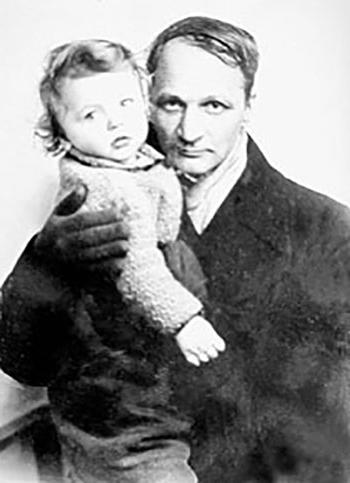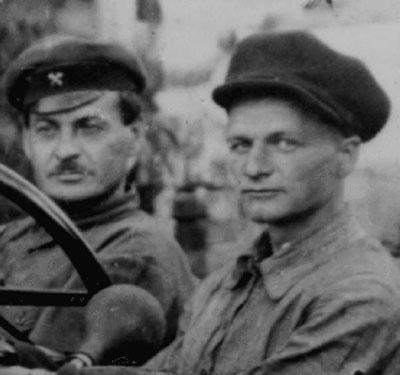Among the writers there are those whose work is not recognized during their lifetime, because it does not correspond to the views of their time. But years or tens of years pass, and their works gain a worthy place in the history of literature. Such writers include Andrei Platonovich Platonov, whose biography is a vivid confirmation of this. He lived a difficult life. His creative works suffered blow after blow. And only in the 80s of the XX century did world recognition come to him.
Childhood and youth
Andrei Platonovich Platonov, whose biography begins in 1899, was born in a poor large family of a station locksmith Klimentov (Platonov's real name) in the city of Voronezh. The fate of the child was largely joyless. Constant need and care for brothers and sisters force the boy at the age of 14 to start working at the railway station with his father. There he masters a variety of professions.
Andrei Platonovich received his education at a parish school, and after he began working at the station, he studied and worked in parallel. This suggests that even in a difficult situation, helping his family, he did not lose his thirst for knowledge, but, on the contrary, he mastered new professions and studied. Around the same time, the creative activity of Andrei Platonovich began. Naturally, the hard work at the station, like the station itself, was rather strongly deposited in the mind of a young man and subsequently often appeared in his work.
Labor and literature
Further, Andrei Platonovich Platonov, whose biography and work from an early time were closely intertwined with labor and a difficult life, begins to work fruitfully as a journalist and writer. At the same time, he studies at the Voronezh Polytechnic University and works at the railway station. Undoubted literary talent is already evident at this time. His collection of poems “Blue Depth” (1922) is published.
A brief biography of Andrey Platonov continues with the fact that his life at that time was directly related to work for the benefit of the Voronezh province. He still does not stop working at the railway station, in addition, he works as a land reclamator. His aspirations are similar to those of many young people. He wants to change the world for the better, believes in technological progress. Youthful maximalism is inherent in him, which is also clearly visible in his literary work.
Surprisingly, at work he does not forget about writing. His stories are full of the same youthful maximalism and faith in technological progress, but he does not forget about such a native village for himself. In addition to what he writes actively for Voronezh newspapers and magazines, he is published in Moscow newspapers.
Biography Platonov Andrei Platonovich is still full of violent literary activity, he publishes his stories about the village "In the Starry Desert" (1921) and "Chuldik and Epishka" (1920). But his inventive mindset is actively manifested in writing and translates into science fiction stories and novels: “Descendants of the Sun” (1922), “Markun” (1922), “Moon Bomb” (1926).
Moscow
The short biography of Andrei Platonovich Platonov that we are compiling continues. In 1927, he and his family moved to the city of Moscow. The decision was quite deliberate, Platonov leaves his job at the railway station and is completely devoted to writing.
Fruitful literary activity is bearing fruit, and the story Epiphanes Gateways is published, which later gives the name to a whole collection of novels and short stories. In the works of that period there is a lot of harsh reality of then-Russia. The author, without embellishment, revises his youthful idealistic and maximalist views, criticizes himself.
In addition to criticism of the social foundations of the time, Platonov sharply speaks of radicalism in the field of sex, in connection with this the pamphlet Antisexus (1928) is published. Here the author ridicules the socialist ideas of abandoning carnal love in favor of socially useful activity. The author speaks quite boldly towards the government and its ideas.
At the same time, a completely unique style of Platonov was formed, the main feature of which, surprisingly, is a certain tongue-tied language and directness of words and turns. Due to this extraordinary and truly unique style, words turn to the reader with their true meaning. Nobody else in Russian literature has such a manner of writing.
In addition to style, Platonov changes the semantic component of his works. Now, the former maximalism and faith in a brighter future are giving way to the philosophical search for the eternal meaning of life. The heroes of Platonov’s works are strange, lonely, seeking people, travelers, eccentric inventors, thoughtful, eccentric loners.
In this vein, the biography of Andrei Platonovich Platonov develops and is reflected in the works that came out of his pen at that time - in the story “Yamskaya Sloboda” of 1927, for example. This is a kind of message to his former rustic style, but revised and revised under the influence of new philosophies. The City of Grads of 1928 is a satire on the Soviet bureaucratic system. The “Hidden Man” of 1928 is about a wandering man who reflects on being amid a raging civil war. In these works, Platonov sets out his quest for an algorithm of existence, a person’s life, its fragility and proximity to extinction are very clearly traced.
Criticism and disorder
It is not surprising that at that time such prose was not recognized by the authorities. Pretty soon, Andrei Platonovich Platonov, whose biography was not so simple anyway, turned out to be out of work in writing. It all started with the fact that the policy towards literature was significantly tightened, which coincided with the publication of the essay “Che-Che-O” and the story “Confused Makar” in 1929, after which Platonov was accused of anarcho-individualism. He stopped printing at all. Even Maxim Gorky, to whom Platonov turned for help, could not change the situation.

The writer was not bothered by everyday troubles. His family was deprived of their own housing for a long time, and this forced them to wander in rented apartments for quite some time. And only in 1931, permanent housing was found - the outbuilding of the mansion on Tversky Boulevard. Today it is the Herzen Literary Institute. Hard times and rejection of the authorities, naturally, negatively affected the situation of the family.
Indefatigable hard worker
Despite all the difficulties, Platonov continues to work on the novel "Chevengur", but, of course, it was not possible to publish the novel at that time. This happened only in 1971, in Paris, after the death of the author.

The content of the novel describes the utopian commune Chevengur and the life in it of the heroes who fall there after long wanderings and tribulations. Life in the commune is truly perfect, everyone there is happy and equal. Just an incredible sight is destroyed with the advent of the army and soldiers who destroy all the inhabitants, including the commune. The novel and everything that happens in it is a reflection of the reality in which Platonov is. Naturally, the reality is not at all as rosy as we would like, but meanwhile the similarities are very tangible. In addition, in the novel Platonov does not lose his corporate identity and language. Some critics say that this manner of presentation is not successful and makes it difficult to discern the storyline of the work.
Thirties
Andrei Platonovich Platonov, whose biography is closely related to political changes in the country, most clearly showed his literary talent in the thirties of the twentieth century. In 1930, Platonov released his main masterpiece - the novel "Pit", which will be published for the first time only in 1987. This is a socialist anti-utopia, narrating about unsuccessful industrialization, the tragic collapse of communism and its ideas. In the story, instead of the palace, a collective grave was built. Brodsky wrote that Platonov subordinated himself to the language of the era.
Fractures
Meanwhile, the social situation in the country has become tougher; it also did not bypass Platonov. At this time, his story “For Future” is published, which describes the failed collectivization, as well as the story “Trash Wind” on anti-fascist themes. Unfortunately, the first received a sharp assessment of Stalin, the second also did not produce its effect. Andrei Platonovich Platonov, whose biography does not please the writer with happy occasions, was again persecuted. They again stop printing it.
In the mid-thirties of the twentieth century, Andrei Platonovich Platonov, whose brief biography is full of difficulties in this period of time, writes mainly to the table, because he is not published.
Everything at the table
Despite this, he works a lot and is very fruitful. The novel Happy Moscow, the play Voice of the Father, is being created. He also writes a lot of literary articles about such writers as Pushkin, Paustovsky, Akhmatova, Green, Hemingway and others. Next, the novel “Juvenile Sea” is created, the theme here is close to both “Pit” and “Chevengur”, then another play appears - “Sharmanka”.
In his works, Platonov gradually departs from social topics and moves on to emotional experiences and dramas. He writes a series of lyric stories, including The Potudan River, Aphrodite, and The Clay House in the County Garden and Fro. Here the author enhances the psychological modeling of the characters, a deep reading of which replaces the author’s ironic attitude to love.
It can be seen from everything that a writer by the name of Andrei Platonovich Platonov had a difficult biography. For children, he also writes, and very successfully, a great example of this is the story "Semyon" about compassion and orphanhood.
In the years 1933-35, Andrei Platonovich Platonov made a trip to Turkmenistan. A brief biography of the writer reports this. Impressed by the trip, he writes the story “Dzhan” in his usual manner of social tragedy with new lyrical notes. Bright speech turns and even sound recording in this work make it surprisingly rich and rhythmic.
Blow after blow
In 1937, a barely noticeable glimpse is planned in the work of a writer named Andrei Platonovich Platonov. The biography, a summary of which is set out in the article, is marked by a pleasant event for him. The writer publishes a collection of his short stories, The Potudan River. But the author’s expectations did not materialize. The collection has been criticized. In addition, in 1938, a case was fabricated against Platonov's only son, and the guy was arrested.
War
During the war, Andrei Platonovich Platonov, a biography whose interesting facts from his life always interested fans of his work, became a correspondent for the newspaper Krasnaya Zvezda. But even here his story, “The Ivanov Family”, caused sharp discontent and was recognized as a slander against the Soviet family.
last years of life
After the war, Andrei Platonovich Platonov, whose biography, photo and other facts from the life of which went to descendants, could not adequately get settled in literature. In attempts to realize the realities of life, he wrote variations on Russian folk tales. In addition, he created the play Noah's Ark. However, time does not give him the opportunity to become popular in life. In 1951, Platonov died of tuberculosis, having been infected by his son, who was released from the camp.
Confession
Platonov was not recognized by his contemporaries. However, in the 1980s, his vivid identity aroused worldwide interest in him. His amazing language and presentation style, as well as his difficult life, finally found his fans and were appreciated. Despite this, many of Platonov’s works have not yet been published.